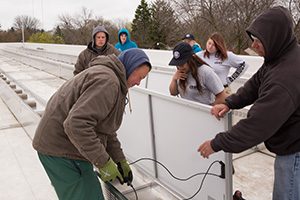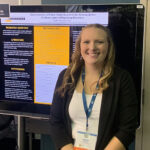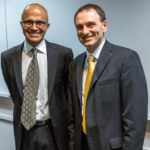Chris Litzau started his career developing real estate. Now he’s moved on to developing young people.
Litzau, who earned his master’s degree in exceptional education at the University of Wisconsin-Milwaukee in 2012, is the founder and driving force behind CERT, a Racine choice school that just completed its first year.
CERT, which stands for Certification and Emergency Response Training, is an alternative high school designed as a hybrid career academy. It provides young people, ages 18 and older, who’ve dropped out or aged out of the traditional public education system with a combination of career skills, licenses, credentials, industry certifications and academic coursework.
“We’re recapturing them. We’re bringing them back to school,” said Litzau. “They’re not coming back necessarily to get their diploma, but the diploma is a byproduct.”

The school’s curriculum is organized around courses designed to prepare students as responders to natural disasters and community emergencies, but that includes a wide range of skills and certifications ranging from earning a commercial driver’s license to becoming certified to handle hazardous materials.
Litzau, who grew up in Milwaukee, got into education at an older age than most. After finishing his undergraduate degree in business and a master’s degree in real estate development at UW-Madison, he returned to Milwaukee to work in urban redevelopment. Eventually, he got involved with the Milwaukee Community Service Corps, first as a volunteer then eventually as the executive director. The corps, modeled on the Depression-era Civilian Conservation Corps, provided programs to help at-risk youth and hard-to-employ teens.
Litzau was instructing young people in career and life skills when he decided he needed more education.
“My background was in bricks-and-mortar construction development,” Litzau said. “I realized that I didn’t really have a background in education, and yet so much of what we were doing was education.”
Working with Nancy Rice, associate professor of exceptional education at UWM, he did his master’s thesis on career academies, looking at what programs were available for young adult students and where there were gaps. From that, he developed his idea of a career academy that would combine experiential learning with academics.
“Chris’s background in business, education, and community service has allowed him to see where these fields can come together to help students, businesses, and communities,” Rice said. “His timing is great because we are at a perfect storm of moving from vocational ed to CTE (Career and Technical Education). People are looking for alternatives to traditional education pathways, and Chris’ CERT is exactly the type of innovative program that communities and businesses are interested in.”
Litzau established CERT as a Racine choice school in September 2015, opening with 13 students. The school is under the umbrella of the Great Lakes Community Conservation Corps.
Learning skills, working with professionals
Students do real projects in a variety of fields, working alongside master electricians to install solar panel arrays or using chainsaws to clear undergrowth with the Bureau of Land Management, according to Litzau. They also have the opportunity to learn cutting edge technology, working with cars that run on compressed natural gas, for example.
One course that’s just been rolled out qualifies students for an official designation in hazardous waste operations, required by the EPA.
“Even if you’re a PhD – you have to have this credential before you are able to set foot on properties where there may be some contamination to clean up,” said Litzau. “It usually runs about $800 to $1,200 in the marketplace, and our students get it for free.”
Students are mostly over the age of 18, and are all in the 12th grade. They have to earn 10 credits to graduate in a combination of class time and demonstrated skills.
“It’s a lot more hands-on learning,” said Daniel Lanouette Jr., 18, one of the students in the program, who likes learning the practical applications of subjects like math and has earned several certifications that will help him in future. “There’s still class, but it’s helping me move in a better direction to get a job.”
The program is affiliated with AmeriCorps, allowing students to accumulate service hours for their work, earning money to further their education.
“By the time they finish, they can have $1,000 or $1,500 in their education account that they can use to go to Gateway, MATC, UWM or UW-Parkside,” said Litzau.
Going on to college
Student Deshawn McGrone, 21, is already planning to use what he’s earned to take the next career steps. He wasn’t interested in high school, but CERT’s combination of study and learning while earning appealed to him. “My experience has been really good. I’m looking forward to enrolling in college,” he said. He’d like to major in ecology and a foreign language, perhaps Korean.
Students have the experience of working and taking classes with professionals in a variety of fields, Litzau said. This summer, for example, CERT students are taking a class on permeable pavement installation, teaming with Spancrete and other contractors to install pre-cast permeable pavement panels in the parking lot of a housing development for the homeless in Racine.
Those experiences of working with professionals “can be very empowering to young people who’ve grown up in neighborhoods where there is high unemployment and few connections to people in the real world of work,” said Litzau.
He hopes the Racine school will be a pilot for future programs, he said, with the goal of encouraging other urban school systems to open similar schools. The school is getting a regular flow of inquiries from potential students, according to Litzau.
“The way I view our program is we’re creating a series of doors and our students can choose to walk through one or go on to the next one,” said Litzau. “But either way they’re going to have those credentials that allow them to walk through one of those doors. We’re talking about economic freedom, opportunities to succeed in life.”







